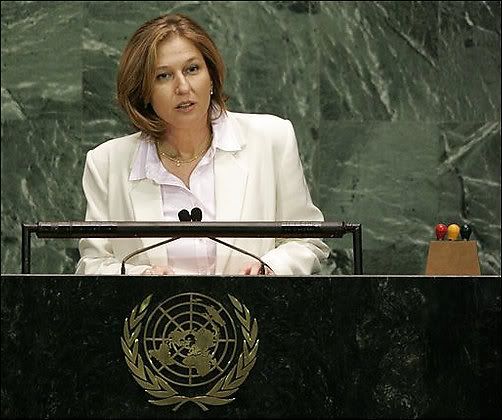Neither here nor there

You know those annoying people on radio and television who insist on talking into the mike just to let you know that absolutely nothing is happening, but that - don't worry - something will be happening very shortly?
Well, as I was in a cab last week passing the Foreign Ministry on my way to work, the correspondent for the radio station my cab driver was listening to was describing the scene inside the Foreign Ministry, where Foreign Minister Tzipi Livni was about to give a press conference on her response to the Winograd report on the Second Lebanon War.
Instead of waiting for the press conference to actually begin before broadcasting it, the radio station aired the incredibly inane patter of said correspondent, who was left to breathlessly report rumors of how Livni may or may not have greeted Prime Minister Ehud Olmert when she met with him before the press conference.
The breaking news sounded more like 11-year-old girls desperately trying to squeeze some excitement out of an utterly yawn-worthy he said-she said conversation they had overheard.
"She said, 'It's good to see you,' or something like that," the correspondent related, to the best of my recollection. "And he said, 'Well, I’m tired.'"
And then came the speculation - because God forbid we should wait two minutes to actually hear what Livni has to say, when it's so much more informative to just guess.
The announcer predicted that, despite all the Israeli and international reporters impatiently waiting to hear Livni speak, the press conference was likely to be rather "pareve," since she wasn't expected to quit the government.
Pareve is a concept borrowed from kashrut laws, in which food is designated meat, dairy or neither - that is, pareve. Meat and dairy don't mix, but pareve food - like fish, eggs and pasta - can be eaten with either steak or cheese, giving rise to the idea that "pareve" is a rough equivalent to either "wishy-washy” or "bland" because it doesn't take a stance; it's neither here nor there.
But Mr. Radio was not quite satisfied with his careful assessment of what the foreign minister had not yet said, and quickly upped his designation to "pareve plus" (פרווה פלוס) - because after all, he noted, Livni did call the press conference, so she must be gearing up to say something.
The correspondent gave no indication, however, of whether he thought Livni's comments would be more likely to go with steak or with cheese.
Labels: Israeli politics, Language, media


1 Comments:
So would I be correct in saying that among Israeli politicians, Livni is the most tzimchoni?
Post a Comment
<< Home